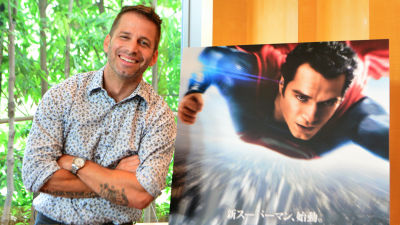Interview with "RWBY" creators, quite familiar with Japanese Animes like "Yuri!!! on ICE", "Erased"

RWBY is a 3D animation series which story sets in the world called Remnant, where science and magic stay together. Human beings, therianthropes and the monsters called Grimm live together in Remnant. Ruby Rose, the main character of the story, enters Beacon Academy where students are trained to become Huntsmen and Huntresses to protect their world from Grimms. RWBY is a story about Ruby and her friends' school days and their growth.
RWBY is created by American production studio, Rooster Teeth, and the dubbed versions by Japanese voice actors have been made in Japan. RWBY Volume 3 was showing on Japanese theaters in December 2016. RWBY crew members, Kerry Shawcross (Director), Gray G. Haddock (Supervising Producer and Co-director), and Miles Luna (Co-director and Writer) visited Japan, so we interviewed them about their works and many other things.
RWBY Vol 3
http://teamrwby.com/
(Japanese) RWBY Official Site
http://rwby.jp/
GIGAZINE (G):
I've seen Gray's Twitter page, and you tweeted that you visited Studio Khara, which is famous for their animation Rebuild of Evangelion (Evangelion: New Theatrical Edition). Did you get something important from them?
A dream come true to spend the afternoon at Studio Khara, meeting and learning from Hiroyasu Kobayashi and Dan Kanemitsu. #RTanimation #RWBY pic.twitter.com/4SdgxDxBIM
— Gray (@graymartigan) 2016年12月5日
Supervising Producer and Co-director, Gray G. Haddock (Gray):
Like some cool toys? Haha. That was an amazing visit. We're big fans of Studio Khara. It was just a pleasure to say hello, and by the end of conversation, we're also talking about technical details such as an approach to 3DCG.
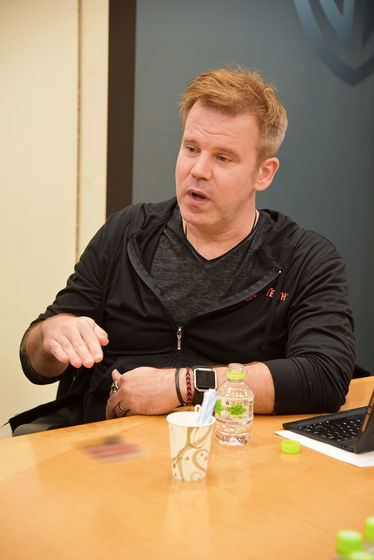
Director, Kerry Shawcross (Kerry):
It was a very great visit. The works of them inspired us in the past, so it's very inspirational for us to be able to meet them and talk to them.
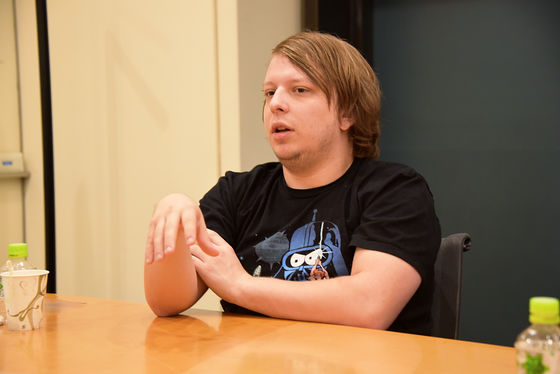
G:
You also tweeted that you went to Mandarake, Golden Gai, and Shrine of entertainment god O Konohana Sakuya-hime. Why did you visit such places?
Kerry:
We have nothing like that in the States, so it was both a spectacle and a pain to our wallets. It was an opportunity to buy a lot of toys and books.
G:
Will those experiences inspire you in the future?
Co-director and Writer, Miles Luna (Miles):
Oh, I'm sure, yes. We get inspiration from everything.
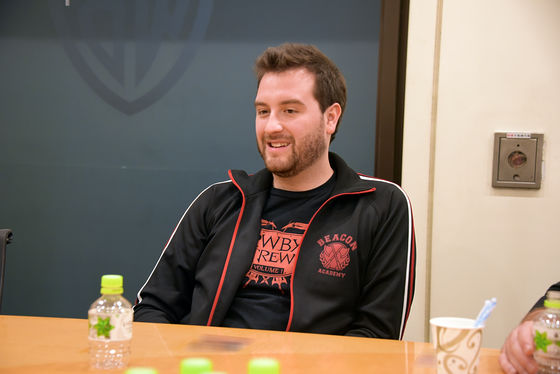
Kerry:
A lot of toys and a lot of artbooks, as well.
Gray:
I would say that, for me, it's collecting props like Dominators of PSYCHO-PASS. Whether props or figures of the characters, they remind me of stories which I like. And I've been inspired by artbooks, that tells us how the artists think of their shows. And also, I think all of us collect music as well. We like to listen to some of our favorite anime soundtracks while we're writing.
G:
I've seen you were striking a pose in front of the posters of Yuri!!! on ICE and Bungo Stray Dogs on your Twitter. What is your favorite animation over the last 12 months?
It's #FANSERVICE !!! On Ice! pic.twitter.com/Uuyy7k5r0b
— Gray (@graymartigan) 2016年12月3日
Bungo Gray Dogs. #FanService pic.twitter.com/Kc9DrH0U9v
— Gray (@graymartigan) 2016年12月3日
Gray:
For me, it's Mobile Suit Gundam: Iron-Blooded Orphans. This season I like it a lot.
Kerry:
I think my favorite of this year is Izetta: The Last Witch. Big rifles are great.
Gray:
From earlier in the year, I think all three of us are fans of Erased. We very much enjoyed watching it week by week, and trading ideas and theories about who the killer was, or what was actually happening. Erased is also a great example of animated story-telling that happened here in Japan, that's willing not happening in the west, which is really strong character-driven stories that don't require special effects. It's not a fantasy piece, so Erased had no mecha, no magic, no big battles. Its visuals are very subtle. In the west, they would say "Why animated that go shoot live action?" whereas we think it's a really good story to tell animated.
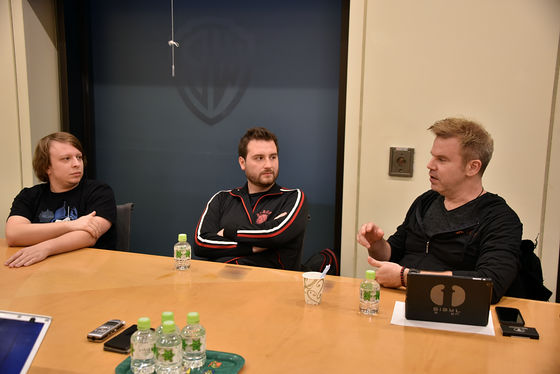
G:
I see.
Gray:
Similarly, on the plane ride here to Japan on this trip, we watched Your name., which was just beautiful, and we stayed up too late. Don't get me wrong, we love huge action scenes, but there's something very special about animated story-telling that still let you focus on, the story and the characters.
Miles:
For me, it's actually Yuri!!! on ICE. I was not expecting to like it as much as I do, so it's been a pleasant surprise, I suppose. It really makes me want pork cutlet bowls haha.
Gray:
We have several female RWBY crew members. They're very much in the sports anime right now, like Haikyu!!, which none of us are really watching, I guess. They said that they're tired of us not having watched any sports animes. And they also said "Yuri!!! on ICE was an another really good character-driven story, so you guys need to watch this."
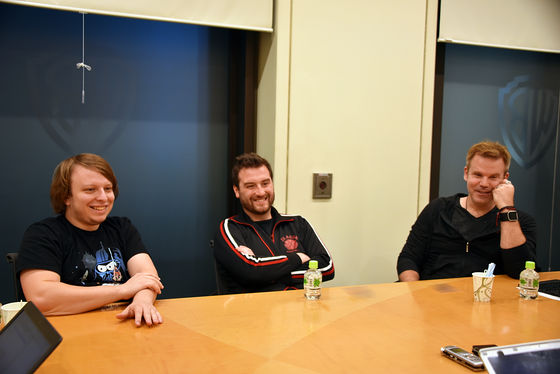
G:
Next question is a basic one. At the beginning of production of RWBY Volume 1, I've seen the interview that there were 12 people in the production. Is that right?
Gray:
It started around 10, and grew just a little bit around by 20 or so. In 2012, for all over Rooster Teeth, there were between 30 to 40 people.
G:
According to the Japanese interview on November 2015, there were 140 people all over your company. And now, how many employees are there in your company, and how many people get involved in the production of RWBY?
Gray:
Rooster Teeth whole is a little over 250 now. And animation department is close to 100. For RWBY specifically, it's close to 80, maybe. Rooster Teeth's growth is surprisingly fast for last couple years. For perspective, the animation department just changed buildings two weeks ago. At the time Rooster Teeth Animation moved into the new building two weeks ago, we were bigger than entire company was when the company moved into its last building two years ago.
Moving Out!
http://roosterteeth.com/episode/rt-life-2016-moving-out
G:
In what section of animation department did you hire people? Or what section did you think that you have to recruit more people since you started production?
Kerry:
Each department has grown since the beginning, and also entire new departments were formed. When we were first making RWBY Volume 1, we didn't have a virtual human, or we didn't have a camera team, or we didn't have a lighting team. But as seasons have gone on, one of the ways that the animation department has expanded was adding those teams.
G:
Do you have any conditions for recruitment?
Gray:
The answer is easy. I would say that the top 2 things we are looking for in a new hire are "Are you a rock star at something? Are you really good at your craft?", and "Are you a team player? Do you work well as a team?"
G:
I see.
Gray:
What's interesting for us is that we only look at the artists' portfolio or the demo on video when we first start to evaluate the candidate. If we're really impressed by their art or the demo of their work, we will say hello to them and also research their backgrounds. So as a result, you know, we Rooster Teeth Animation has become a very diverse department. We have good range of both male and female employees, we have employees from several countries now, just because we focus on their work first. Some people are formerly educated, some people never went to school. They just talk themselves online.
Kerry:
It doesn't matter how you've got there as long as you meet us now.
Gray:
There's also been interesting phenomenon. Every so often, we hire someone from the Rooster Teeth's audience or community. Fans have sent us the samples of their work, usually it's a fan art of RWBY or our other shows. Sometimes we are so impressed by that, and we aid them to have a job.
Gray:
If they are inspired by RWBY's action, they try to show us animation that they've made, which is like RWBY's action. Maybe they're good candidates to become junior animators.
G:
For that matter, how did you join your company? I couldn't get any information in Japan.
Kerry:
My high school had a program that you go find someone in the industry you want to work in. It's a kind of mentor thing, because it was just a high school. I was able to get Burnie Burns who helped found the company. And through that I got an internship and just try my best to work hard.
Miles:
I worked with an another Rooster Teeth employee named Brandon while we were in college. He works in the live action department of Rooster Teeth. I was volunteering a few times to work on set with the company. And then through his recommendation, I was able to get an internship at the company, and got a work from then.
Gray:
Rooster Teeth is the third attempt trying to have a good career haha. I always wanted to have something to do with story-telling, but after I got out of school, I spend many years doing software engineering during the day, and acting or creating projects nighttimes and weekends. And I got frustrated with that, because it wasn't creative enough. So I quit the software job and taught myself production. I was a freelancer for many years, and I got a phone call from Rooster Teeth.
G:
Wow.
Gray:
Now it's very strange how all my experiences still come together in my work at Rooster Teeth. A really neat, cool, and common thing between all three of us is, with Rooster Teeth, the more different things you can do, then the more likely it is to find more success. We have a lot of generalists. Each of us starts from doing two or three small every specific tasks, and then years go by, you just keep on doing more and more bigger interesting things.
G:
All of you have a role of director or co-director in RWBY. I'm wondering what you are directing.
Gray:
Kerry is the main director. While he was a co-director for Monty Oum on Volume 1 and 2, then he became a full-director starting Volume 3. Co-directors are job assistants to help Kerry.

G:
Oh, that's what it means.
Kerry:
They help me out. Miles helps a lot with the voice instructions. Miles and I direct the voice actors together. Gray helps a lot of the finishing, in terms of the animation, the edit, the composites, and the audios.
G:
As a director, you would have to make tough dicision during the production phase as there is a limited budget and time. You want to make the show high quality, but also have to think about the deadline. So how do you balance quality and time?
Gray:
Time is always the challenge haha.
Kerry:
It's very important for us that we continue to increase the quality of the shows, so even though our budget is better and maybe we do have slightly more time, we won't let it be easy for ourselves.
Gray:
Every year, Rooster Teeth helps us. They give us a little more resources year after year, but we're trying to do more things every year and we should do that, maybe.
G:
It seems that it takes one year to create each volume of RWBY. Compare to the other ordinary 3DCG animation series, what are the most difficult things in making RWBY?
Miles:
We have a new volume every year, but in reality, we only have about 6 months of production to work on every volume of RWBY. The other 6 months of the year is time allocated towards another production that we do for Rooster Teeth.
G:
Oh, that's surprising.
Miles:
It's a very short time especially when we look at the length of Volume 3. Our animation team needs to be rather flexible. We are jumping between the style of animation for RWBY and the other shows which are not always going to be animated in the same manner, so it can be difficult jumping between one style of show to another style show. However, it also keeps things fresh and new, and keeps things from getting kind of stale and boring.
Gray:
That's why the crew size is growing bigger in several years. We are also learning how many people we need to support making three hours of content every 6 months. And stir people to sleep, also, haha.
G:
Next, I have a question about scripts. When you write a script, I think that sometimes you stop writing due to a lack of ideas. What makes you to proceed writing scripts?
Miles:
If we knew the definite answer of that question, we'll be very wealthy writers haha.
Kerry:
The thing we try to do the most is to talk to other people among the team about the scene that we're trying to write, or sometimes just go to sleep and look at it on the next day or even next week, just take some time away from it. And usually when least expect time, you got "Oh! Now I know how to fix it."
Miles:
A lot of times if it is a matter of inspiration or motivation, I sometimes go back and watch all the episodes or look at fan arts that are posted online. If it's sometimes where I'm trying but the idea just won't come, Kerry says to me that I should just go on a walk. Or, a lot of times I'll get ideas in the shower, but sitting in the shower is not very good for the environment and my electric bills haha.
G:
There are a lot of styles of writing, like you start writing the beginning and the ending at first, or you keep on writing from the beginning to the ending. How do you write a script?
Miles:
A lot of times that we do is we will start from the very basic level, say "What is the story of this volume? What are the beats throughout the volume?", like the plot points. And then guess what do we want, how do we want the characters to grow throughout the volume, as well.
Kerry:
It's just kind of turns to a puzzle from there of moving things around. There's also several moments that we have been thinking about for years, then "Okay, this is the volume where this happens and where this is fitting in."
G:
I want to ask you a question about community to support RWBY. Do you think there's the change from RWBY Volume 1 to Volume 4 in the community? Have you witnessed the change in the fan community?
Miles:
It is grown faster than we could ever have imagined.
Gray:
I would say that I haven't really picked up the very specific trend. It has a broad audience, you know, good mix of male and female, and other interests and age ranges. I would also say that our audience are getting much younger than we ever thought. That presented some challenges when it came time to tell some of the more serious parts of the story in Volume 3. We have to give a message to the audience saying that just because the first couple of volumes of RWBY that the story has a kind of particular feel to it, we're still going to make the story grow up over times, so please be ready for that.
We are surprised when we go to conventions, we meet fans who come together with a older brother or sister or babysitter. Or mom and dad are watching the show with kids as young as 8 or 7 years old. They would present the young fan to us, dressed as their favorite character. Sometimes that character is Penny, and we have to pull their mom or dad aside, and say "You might wanna start watching the show early before you show it to your child, and then decide if you wanna show it to them." It's because the audience has grown so much, and it has some more different ways, that we can start to do spinoff series like RWBY Chibi. So people want even more comedy, or there are characters that they don't want to say goodbye to, or, they're very young so that we want to make sure that they still have RWBY shows they can watch. It's because that the audience is so big and different that we must start experiment.

G:
Many Japanese companies don't have much interaction with fans, but you have a lot of interaction with your fans. What did you learn from being connected with a fan community? What do you think you have to be careful about?
Gray:
One of the really nice things about the interaction with the community is that it helps us keep motivated. It's the combination of being very active at conversation with the community and observing their responses and talking to them while we still making the show and releasing the show. That helps fuel our works. We watch their reaction to a new episode, that makes us excite to go make the next one. It's very different from like a feature animated production, where you work on something for a couple of years and you don't know if the audience is going to like it or not, and then you product the world and you say goodbye to them. Instead, this is more like, you know, it's almost like a theater or stage plays, where you're getting more instant reactions from your audience right there in front of you.
G:
I see.
Miles:
One of the interesting side effects of being close to our audience, that has potentially negative at times, is by being able to put a face to the audience and know the people who are watching our show, it adds much pressure to make the show. We always want to tell the best story that we can, but if we disappoint the audience, then it really feels like we let somebody down. But I think this is a good thing because they just add some more pressure across to do the better job and because that means to make a better story.

Gray:
I think another risk would be the time will come when you need to tell a very difficult part of the story, and you know, it's going to make some of the audience either sad or mad. You start to see reactions happened to the community, but you have decisions to make you don't want to necessarily change the story just to appeal to them. Sometimes if you are too sensitive to audience's reaction, then maybe you're not being true at the story.
G:
I've seen your official site many times, and you have free users, FIRST members who pays $4.99 per month, and Double Gold members who pays $34.00 per month. I'm wondering about the ratio of free users to charged members. If you don't mind, I want to get your answer.
Gray:
I'm not entirely sure. Thankfully we get to do more fan stuff like telling the story. We don't concentrate too much on the business side. I would say that we feel very lucky, we feel very appreciative that RWBY brings whole new kind of audience to Rooster Teeth, that we didn't have before. And we do see positive amounts of growth both paid subscribers and free members of the website. It's been great to see a growth in Rooster Teeth FIRST. FIRST members get to see the episodes the full day before the rest of the free members of the website. And they get an additional access to talk to Rooster Teeth staff.
G:
You can talk online?
Gray:
We are trying to talk to everybody. And they get to see some more interviews. We do special live interviews, live streaming Q and A sessions with FIRST members. The production of RWBY still relies heavily on those paid subscribers, so we want to treat them very special things. But the reason why Rooster Teeth has a hole is because it has a very diverse approach to its content. You know, the first 24 hours is for our FIRST members, and then rest of that week is for all the other members of the Rooster Teeth community, and then after that week, the episode goes to our other distribution partners like YouTube. We're trying to keep everybody happy, but...
G:
This will be the last question. In the production of RWBY, what is the core part to you, and what do you want to describe the most?
Miles:
What I always feel is the characters are the most important part of the story. It's falling love with the characters, putting them into difficult situations, and seeing how they react. Some may overcome challenges and become heroes, others may be changed by them and become villains, and ultimately I think that is one of the most interesting parts of story-telling.
Kerry:
For me, in terms of RWBY and story-telling, it's important to people feel emotion whether it's a laughter from a joke,or "Fight scenes are awesome and really cool", or making them cry because their favorite characters die. Just being the idea of a fictional piece of work can have a real impact on somebody is why I like the entertainment and why I like making the entertainment.
Gray:
I would say that I agree with the goals that Kerry and Miles are talking about, but what I like about how RWBY accomplishes those goals is the balance between character moments and action. I don't think it makes sense for us to have action all the time, but some people ask for that. You're not going to be emotionally invested unless you spend some other time with the characters. Miles and Kerry put so much charm in heart, characters that you spend time bonding with them, and then your emotions are much bigger when the characters are jumping in later.
G:
Thank you so much for your time today.
The Official trailer of RWBY Volume 3 is as follows:
RWBY Volume 3: Official Trailer - YouTube
RWBY Volume 3 was showing on Japanese theaters until December 16 2016. Trailer in Japanese is as follows:
RWBY VOLUME3<日本語吹替版> 予告編 - YouTube
Related Posts:






